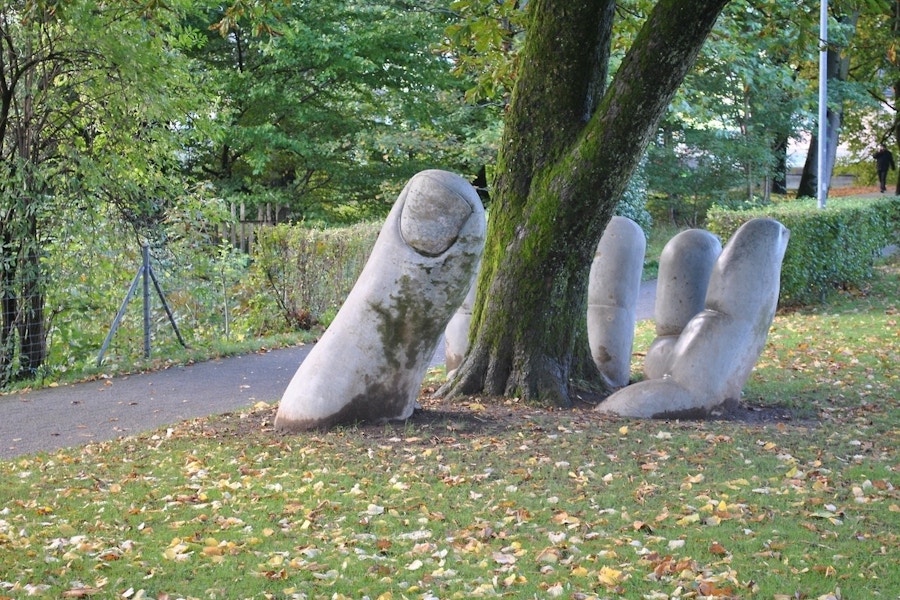How does the reality of God as Trinity help us to understand creation? The answer is twofold, for through the beauty of the Trinity we perceive both the utterly gratuitous character of creation and also the amazingly personal intention that stands behind it.
On the one hand, the gratuitous character of creation. On Christian grounds, we cannot begin to think of the created world as satisfying some internal need in God. The Holy Trinity has never been lonely, has never found itself lacking in companionship. God did not create the universe, angels, or human beings to fill a relational vacuum in his own life, a divine “felt need” of sorts.
Instead, creation is a fundamentally contingent reality. Here’s what I mean. Creation did not have to exist at all; it is solely the result of God’s freely chosen act of unconditional, unconstrained giving. In this respect, it reflects the interpersonal self-giving of Father, Son, and Spirit from all eternity, but it is not essential to it, as though the mutual love within the Trinity needed somehow to be supplemented.
No, God’s decision to create was utterly free, since deepest self-giving was already present in God’s own inner life to an infinite extent. Hence, creation is strictly unnecessary, a gracious gift from beginning to end. When the richness of God’s own Trinitarian life fills our vision, we might almost forget that creation exists at all. God owes us nothing and needs nothing from us. Certainly creation can make no “claim” of any kind whatsoever on God, for his attention, his interest, his love.
On the other hand, when the act of creation takes place, it is none other than the intensely personal God who does the creating. Though he has no need to create, still the act of creation truly does reflect the infinite, eternal love that God himself is, a love whose very nature is to share, to give, to relate, to move toward the other. The creating God is this love, and this means not only that love is foundational to all created things but also that the act of creation cannot be thought of merely as a work of detached, inhospitable “production,” nor can the created world be thought of merely as an objective, external “product.”
If relationally rich, infinitely personal love graciously speaks the universe into existence and then joyously maintains its existence, we will hardly be surprised if creation is somehow intended to share in that very same eternal communion. The intensely personal nature of God invites us to expect that the relationship between God and creation will never be merely a static business of maker and made, source and product. It will instead involve real personal engagement, real mutuality, real self-giving, real interpersonal knowledge and exchange.
Scripture confirms this expectation. When we come to the opening chapters of Genesis, we find in the sequential days of creation just what we might have anticipated, that is, a steady movement of increasing diversity and complexity both in the creatures themselves and in their relationships. The story culminates in the appearance on the sixth day of a remarkable creature that is different from all the others and that completes all the others. With the appearance of the man and the woman, the whole narrative is drawn to a very intentional, because deeply personal, climax.
We know that this climax is intentional because the text of Genesis 1 goes out of its way to make the point. We find no fewer than five significant indications that something unprecedented is taking place with the creation of the human pair on the sixth day.
- There is a linguistic change, from language of God’s sovereign fiat (“Let there be … ‚” etc.) in verses 3, 6, 9, and so on, to language of tender fashioning (“Let us make …) in verse 26.
- There is a stylistic change – very significant in ancient cultures – from prose to poetry in verse 27.
- There is a change in the nature of the created thing in verse 26, as God decides to make this last creature, and this creature alone, in his very own image — a point to which we’ll return next week.
- There is a relational change in verses 26 and 28, as God bestows upon the man and the woman an authoritative dominion over every other creature.
- Finally, there is a change in God’s evaluation of the whole of creation, advancing from “good” in verses 4, 10, 12, and so on, to “very good” in verse 31.
Each of these features of the narrative provides an unmistakable hint that with the introduction of this last, best, unique creature, the work of creation is completed, and the created world is now prepared to be all that its intensely personal Creator intends.
This series has been adapted from Steven D. Boyer and Chris Hall’s The Mystery of God: Theology for Knowing the Unknowable. Hungry for more? Please visit Baker Academic for more information.


